Education
CEPIDE Lays Ground for Innovative Doctoral Education in Ugandan HEIs
Published
5 years agoon
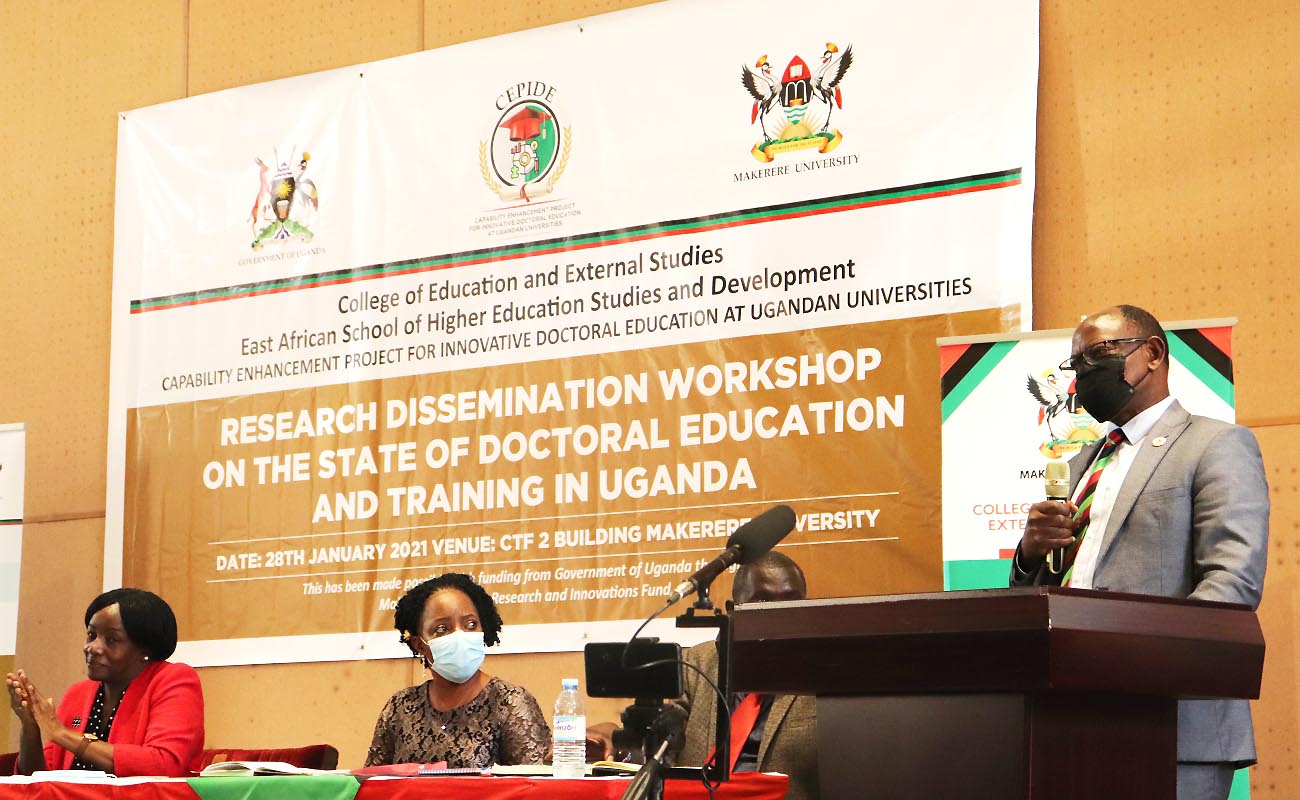
CEPIDE is an acronym for the Capability Enhancement Project for Innovative Doctoral Education at Ugandan Universities (CEPIDE). Funded by the Government of Uganda under the Makerere University Research and Innovations Fund (Mak-RIF), this two-phase project aims to build institutional capacity and individual capabilities of doctoral supervisors at Ugandan universities by giving rise to a shift from traditional modalities to innovative approaches of doctoral education.
On 28th January 2021, stakeholders gathered in the Central Teaching Facility 2 (CTF2) Auditorium, Makerere University, to receive findings from Phase one of the project. This phase entailed conducting a baseline study of the state of doctoral education in Uganda. Phase one will also involve writing a course module for a specialized blended capacity building training for supervisors of doctoral candidates at Ugandan universities. Phase two on the other hand will involve implementing the course module developed in phase one as well as creating a database and an online platform for e-networking, knowledge sharing and professional support among doctoral supervisors in Ugandan universities.
The East African School of Higher Education Studies and Development (EASHESD) under which CEPIDE falls has aligned its activities along four thematic areas namely; Policy and advocacy, Research and Innovations, Leadership and Management, and Training and Learning. These thematic areas position EASHESD to contribute to research in the understanding of the field of higher education, with the CEPIDE study intricately feeding into this.
EASHESD is predominantly a graduate School offering Masters and PhD programmes and as such, the CEPIDE study on improving the quality of Doctoral Education and Training in Universities in Uganda is a fulfillment of its mandate. Addressing the dissemination workshop, the EASHESD Dean Dr. Ronald Bisaso elaborated that CEPIDE study is aligned to the School’s own practice and grounded in research undertaken therein.
“As Dean, I am happy to note that the members of staff from the East African School of Higher Education Studies and Development wrote proposals and received funding to support three projects under the Makerere University Research and Innovations Fund (MakRIF). These projects include: i. Capability Enhancement project for Innovative Doctoral Education at Ugandan Universities (CEPIDE), ii. Enhancing Women to Leadership positions in Universities in Uganda (WOLEP) and iii. Pedagogical Leadership of Academic Staff in Higher Education Institutions to Enhance Graduate Work Readiness and Transition to Work (PLASHE-WIL).
“Through the aforementioned research projects, the School has ensured that key stakeholders namely female Vice Chancellors, the National Council for Higher Education (NCHE), National Planning Authority (NPA) and the Ministry of Education and Sports (MoES) participate in the research projects as well as actively engage with researchers during the dissemination of findings on higher education” remarked Dr. Bisaso.
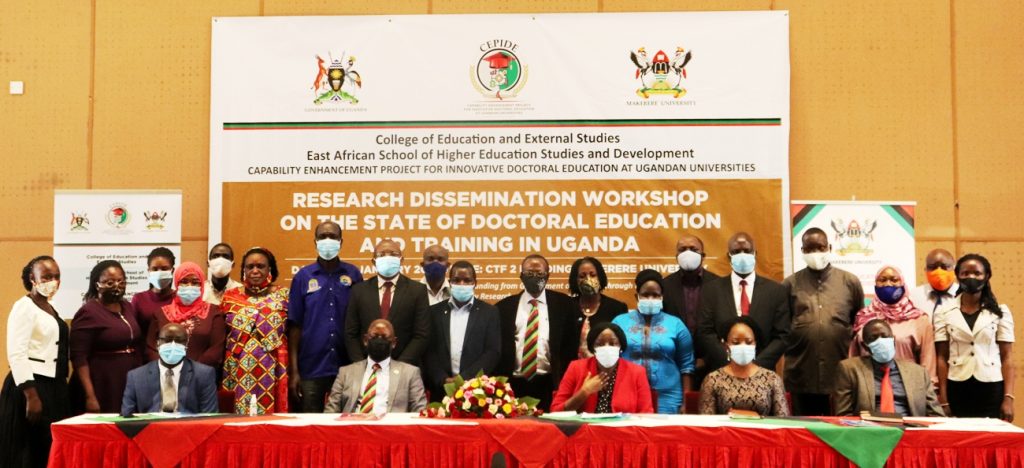
He concluded by saying that the involvement of key stakeholders in research and dissemination has enabled EASHESD to build a network that connects research in higher education with Government agencies that focus on higher education and development as well as universities in Uganda.
Presenting an overview of the project, the Principal Investigator (PI) Dr. Irene Etomaru said the study was driven by the acute shortage of a critical mass of doctorates with requisite knowledge and skill sets to undertake translatable research and train innovative researchers in Uganda. “There are only about 26 researchers per million inhabitants in Uganda, which is well below the world average of 1,083, about 1,000 PhD holders in various disciplines are unevenly distributed across the academia, government ministries, agencies and research institutes and 80% of these are at Makerere University.”
The PI shared that through CEPIDE, it is envisaged that an Enhanced Postgraduate Environment (EPE) will be created in Ugandan universities. The EPE, she said, would lead to the nurturing of a new cadre of doctorates able to undertake translatable research, train innovative researchers as well as develop innovative models to address local societal needs and improve Uganda’s innovative capacity.
In terms of data collection, the CEPIDE team reviewed laws, plans, policies and reports, and held Focus Group Discussions (FDGs) with NCHE. Furthermore, they collected data from fourteen institutions offering doctoral education and training in Uganda and held in-depth interviews with a total of 49 participants.
Prof. Fred E. K. Bakkabulindi another member of the research team tasked with the role of mentorship then delved into the context and history of doctoral training in Uganda. Statistics for the period 1970-2020 revealed that Makerere University at 90% had the highest number of PhDs among the five doctorate awarding Public HEIs in Uganda. Mbarara University of Science and Technology (MUST) followed with 7.2%, Gulu University (GU) with 1.5%, Uganda Management Institute (UMI) with 1.1% and finally Kyambogo University (KyU) with 0.2%. The glaring difference in percentages could be attributed to the fact that whereas Makerere’s statistics stretch back to 1970, the other four HEIs only started awarding PhDs in the 2010s with GU coming closest in 2013.
The statistics shared by Prof. Bakkabulindi further proved the unfortunate fact that doctoral education and training in Uganda is biased in favour of males. Only 23.4% of the total numbers of PhD graduates in the aforementioned 50-year period were female. UMI led the percentages with 45.5%, followed by Makerere at 23.6%, MUST at 20.5%, GU at 14.2% while KyU is yet to graduate any female PhDs.
Prof. Bakkabulindi also examined the Science Technology Engineering Mathematics (STEM) versus non-STEM dichotomy with telling results. KyU proved that it is a predominantly STEM HEI by producing 100% STEM PhDs. KyU was followed by MUST at 79.5%, Makerere at 67.6%, GU at 40%, while UMI produced none.
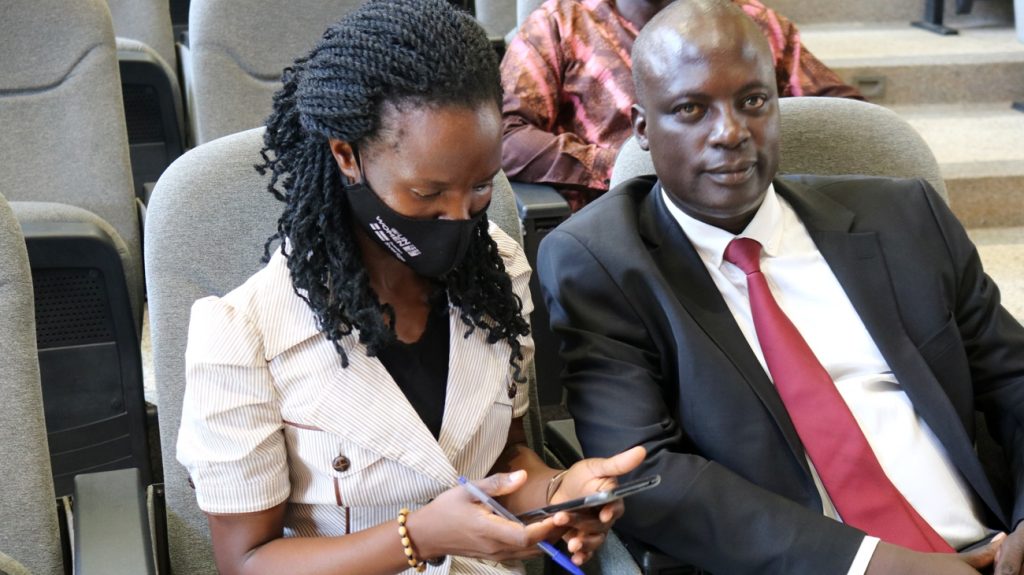
With the contexts established, it was time for the participants to hear the team’s findings from their baseline study. Dr. Tom Balojja who also doubled as the day’s emcee in delivering a summary of the findings shared that doctoral education and training in Uganda had low throughput rates. Furthermore, doctoral education and training is biased in favour of males and STEM disciplines, and has its capacity concentrated in Makerere University.
He then went on to present the findings in detail, as espoused by the European Commission’s Seven Principles of Innovative Doctoral Training. These seven are; Research excellence, Attractive institutional environment, Interdisciplinary research options (cross-disciplinarity), Exposure to industry and other relevant employment sectors, International networking, Transferable skills training and Quality assurance.
The CEPIDE study recommended that;
- Government of Uganda should integrate doctoral education and training in national development planning within the context of the policy objective of increasing the percentage of the GDP spending on Research and Development (R&D).
- National targets should be set and resources should be committed to achieve the set targets in order to address concerns about the inadequacy of the critical mass of researchers in the country.
- Government of Uganda should introduce a sufficient and well-structured legal framework necessary to regulate doctoral education and training. The legal framework should regulate the structure of doctoral programs and curriculum issues, support systems and staffing to improve the quality of the postgraduate training environment in HEIs in Uganda.
- Government of Uganda and institutions offering doctoral education and training should work out mechanisms which will enable them to work with the industry and other research institutions in promoting research and innovations.
- Institutions should transit from offering PhD by research to the taught PhD
- The scope of doctoral education and training should be broadened to incorporate other models of the doctorate such as PhD by coursework (taught PhD), Professional doctorates, Work-based doctorates.
- The role and funding of Doctoral Schools in Universities should be underscored to create enhanced postgraduate environment (EPE)
- More research and interventions into doctoral education and training in Uganda.
Reacting to the presentation, the Director Directorate of Research and Graduate Training (DRGT), Prof. Buyinza Mukadasi requested the NPA to come up with a PhD training strategy for Uganda that clearly outlines the demand for PhDs particularly in the industry as well as resources to train them. He emphasized the need to preserve the quality of PhDs trained as the drive for more PhDs is impressed upon HEIs. In the same breath, the Deputy Director DRGT, Dr. Robert Wamala advocated for a mechanism to ensure productivity of PhDs as a third factor to consider in addition to quantity and quality.
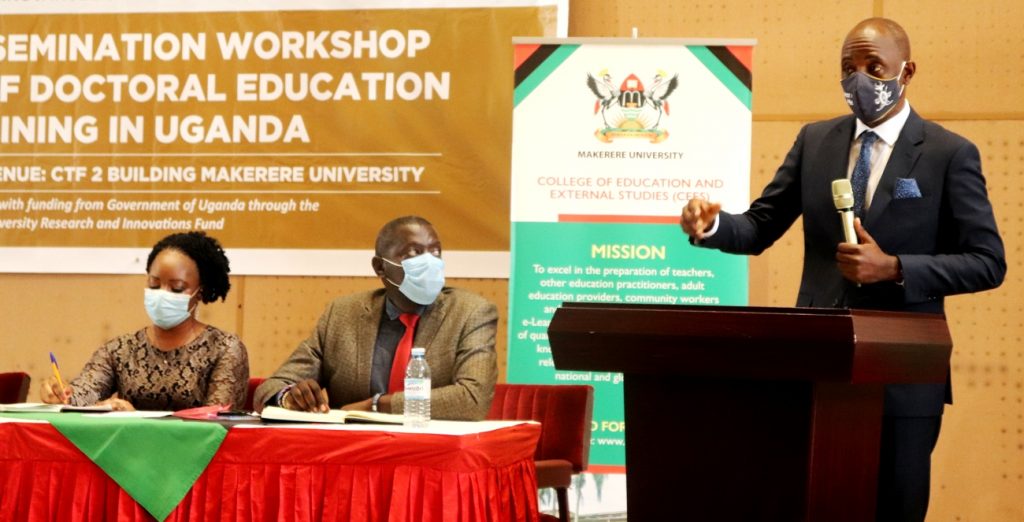
Dr. Paul Birevu Muyinda, the Deputy Principal College of Education and External Studies (CEES) in his remarks commended Mak-RIF for changing the terrain of research and innovations at Makerere University. “CEES was one of the Colleges that wasn’t attracting much funding but with the coming of Mak-RIF, we have seen a very significant increase from only two research Projects to twenty.”
He thanked NPA for accepting to conduct both virtual and physical training for staff at Makerere University who are interested in writing impactful policy briefs.
Dr. Sabrina Kitaka who represented the Mak-RIF Grants Management Committee (GMC) Chairperson, Prof. William Bazeyo commended the CEPIDE research team for recognizing that Makerere as a leader ought to strive to bridge the gap in doctoral training and education between itself and younger institutions. She thanked the Government of Uganda for providing funding to more than 500 Research Projects all aimed at informing national development priorities.
“The Volatility, Uncertainty Complexity and Ambiguity (VUCA) phenomenon created by the COVID-19 is teaching us how to be innovative by disseminating our findings both physically and online. Any innovation that results in training of scholars is not only exciting but brings closer the possibility of an education that is boundless” said Dr. Kitaka.
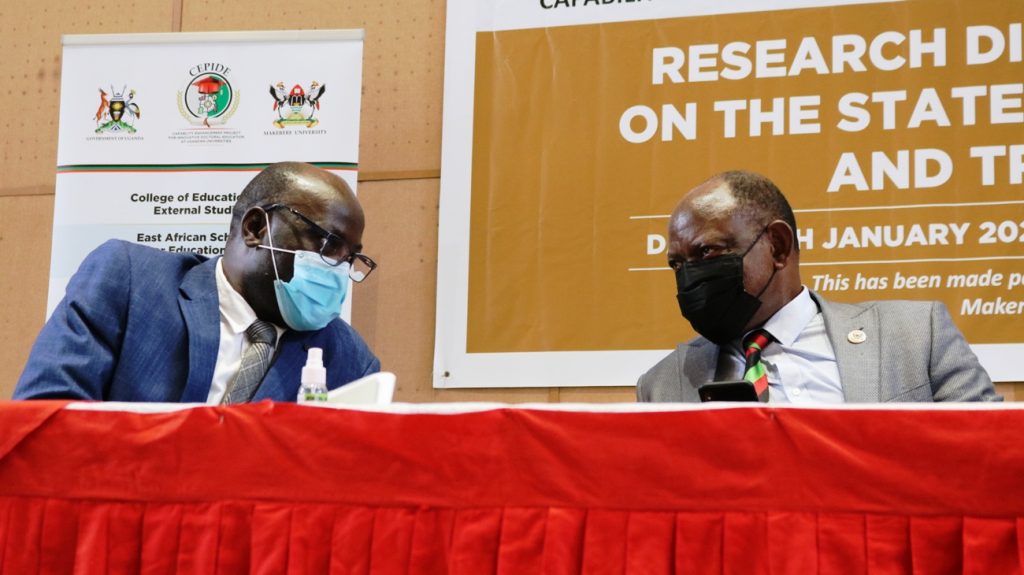
Mr. Timothy Sejjoba who represented Dr. Jane Egau, Director for Higher Technical and Vocational Education and Training – HTVET, Ministry of Education and Sports (MoES) in his address congratulated Makerere University upon not only securing funding under Mak-RIF but also putting it to good use. “We believe that you are going to inspire other institutions to reach the heights that they should.”
He noted that the CEPIDE study had brought very interesting findings and conclusions to the fore and that his Ministry would be very glad to continue discussing these with HEIs. On the issue of quality assurance for PhDs Mr. Sejjoba advised that HEIs ought to be self-regulating so as to guarantee the brand of their programmes and graduates in the job market.
In his remarks, the Vice Chancellor, Prof. Barnabas Nawangwe congratulated the CEPIDE team upon delivering possibly the most important Mak-RIF seminar to-date, owing to its addressing of the University’s core strategic direction head-on. He equally thanked the Government of Uganda for providing; i. Funding for over 500 research and innovations through Mak-RIF, ii. Increasing the monthly salary of a Professor to UGX 15million, and iii. Funding infrastructure development for research. “We now have some of the best labs anywhere in the world and there is no reason why as a University we cannot drastically contribute to transformation of our society.”
He reiterated Makerere’s commitment to support other HEIs to build their capacity in doctoral training and teaching and commended the decision by the Higher Education Student Financing Board (HESFB) to start offering loans for postgraduate study at Higher Education Institutions (HEIs) in Uganda.
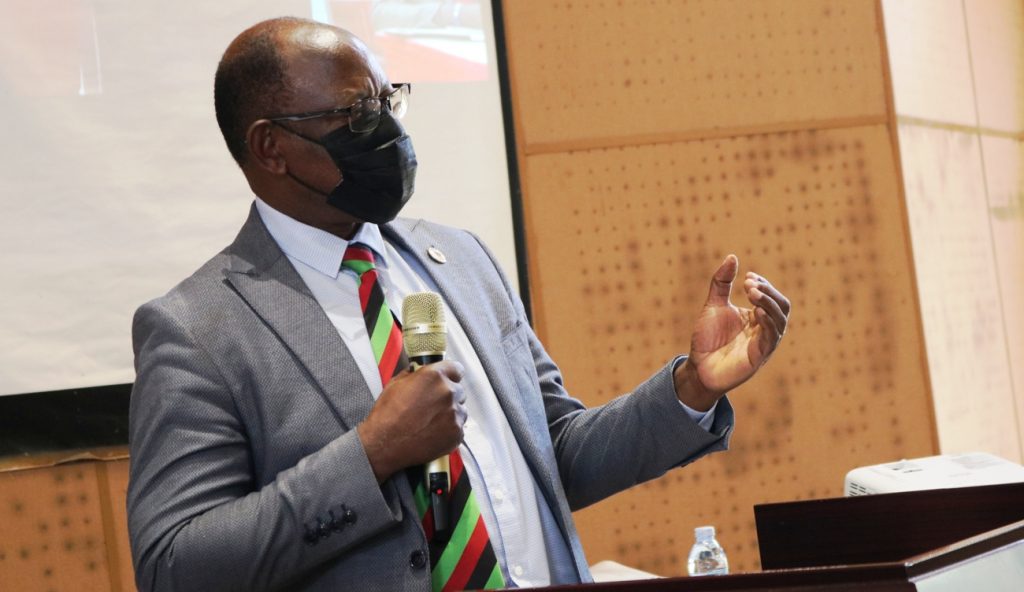
The Executive Director National Planning Authority (NPA), Dr. Joseph Muvawala in his address commended the ongoing policy work between the School of Economics, College of Business and Management Sciences (CoBAMS) and his authority, noting that this ought to be duplicated between other Schools and Government Ministries, Departments and Agencies. He shared that increasing number of graduate students seems to be sufficient condition for Uganda to take off in terms of economic development and emphasized the importance of Makerere University implementing its new 10 year strategic plan, which he described as “good”.
He advised the CEPIDE team and all researchers to improve their capacity to write policy briefs, noting that policy makers lack the time to read research papers in their entirety. “I am here to say that you have our full support as NPA and my colleague Dr. Mugendawala will draft a concept on how to connect graduates to industry.”
Concluding the day’s remarks, the Chief Guest Dr. Nora Mulira who represented the Executive Director NCHE, Prof. Mary Okwakol acknowledged that the Council as a participant in the CEPIDE study had gleaned a number of lessons to incorporate in the UNESCO instrument that feeds the state of Uganda’s Higher Education. She added that the study provided a number of options on how to advance the National PhD programme and thanked the Vice Chancellor for effectively using the funds received from Governement of Uganda.
“To the Principal Investigator, this is a pivotal study that is going to move Uganda ahead and is well aligned with strategic development framework as enshrined in NDPIII and Vision 2040, which look at research and innovation as a driver for development” commended Dr. Mulira.
She urged the research team to formulate an output plan that stipulates the specific actions that need to be undertaken by particular stakeholders within set timelines.
Article by Public Relations Office.
Please see Downloads for presentations

You may like
-
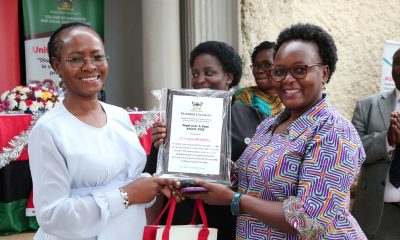

Dr. Pamela Khanakwa Honored for Steering Record 18 PhD Candidates for the Mak 2026 Graduation
-
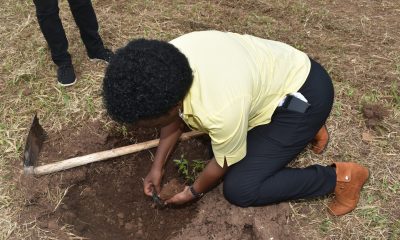

Call for Applications: QCF Postdoctoral Research Fellowships
-
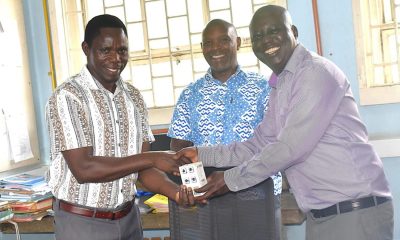

Dr Oruru Bosco Appointed Acting Head of the Department of Physics
-


Advert: Admissions for Diploma/Degree Holders under Private Sponsorship 2026/27
-
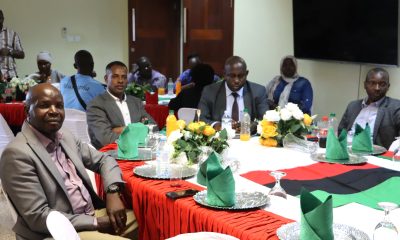

EfD Uganda Marks 2025 Milestones, Sets Strategic Path for 2025–2029
-


Makerere University Launches Knowledge-Sharing Platform to Drive Innovation and Economic Growth
Education
Facilitating Access and Participation through Higher Education Access Programmes and Connected Education for Students with Refugee Backgrounds: A Global South Delphi Study
Published
1 month agoon
December 19, 2025
On 17th December 2025, a Delphi workshop was convened at Kampala Kolping Hotel, providing a collaborative platform for dialogue on standardisation and harmonisation of Higher Education Access Programmes (HEAP) across institutions, alongside strategies for portability and verification on demand through a HEAP Digital Passport. Discussions centered on accreditation, diversification of delivery and learner support, and future scenarios for HEAP and Connected Education.
Expert panelists underscored the urgent need for:
- Standardised HEAP frameworks across universities to ensure consistency in admission pathways.
- Harmonisation of HEAP curricula, duration, and procedures to eliminate barriers that hinder access and transition.
- Development of a HEAP Digital Passport enabling portability of credentials, secure digital verification, and integration with national qualification frameworks and international recognition systems.
Uganda, is one of the leading refugee-hosting countries with inclusive education policies, faces challenges in ensuring equitable access and participation for students with refugee backgrounds. While some universities offer HEAP as a bridging programme for marginalized learners, variations in programme design, delivery, and support systems still exist, which may lead to violations of accreditation. This calls for urgent standardisation and harmonisation to strengthen HEAP as a recognized transitional pathway into higher education.

Funded by Education Beyond Borders, researchers from Makerere University and the University of Edinburgh engaged stakeholders from public and private universities in Uganda through participatory workshops and expert meetings. This Delphi Workshop aimed providing a collaborative platform for dialogue on standardisation and harmonisation of Higher Education Access Programmes (HEAP) across institutions, alongside strategies for portability and verification on demand through a HEAP Digital Passport. Discussions centered on accreditation, diversification of delivery and learner support, and future scenarios for HEAP and Connected Education. The project is led by Dr. Rovincer Najjuma (Principal Investigator), with co-PIs Dr. Rebecca Nambi and Dr. Michael Gallagher.
Listening to experiences and co-creating solutions

Opening the workshop, Dr. Rebecca Nambi, a Senior Lecturer at Makerere University and Co-Investigator of the project, emphasized that the engagement was not about formal presentations, but about listening to experiences of students with refugee backgrounds that have accessed Higher Education using the HEAP programme and co-creating solutions with Expert Panelists.
Highlighting the persistent disparities in refugee participation in higher education, Dr. Nambi explained that while global and national efforts often focus on primary and secondary education, higher education remains critically under-supported. Drawing on years of research, she observed that refugee participation in higher education has historically stood at three percent (3%), later improving to about seven percent (7%), leaving the highest number of refugees excluded.
“Where do they go if they do not transition to higher education?” she asked. “Who supports them and how do institutions respond when learners arrive with disrupted educational trajectories?”
Shift from mere documentation of marginalization and adversity to practical interventions
Dr. Nambi underscored the importance of moving beyond research that merely documents marginalizationa and adversity. She advocated for practical interventions that improve systems for people with refugee backgrounds and strengthening education for host communities. “Addressing refugee education is part of a broader global agenda shaped by migration, conflict, and labour mobility in several countries.”
Dr. Nambi emphasized that HEAP provides a legitimate pathway for students with refugee backgrounds, and the ongoing adjustments aim to align the program with national standards and student needs.
Central to the discussion was the concept of connected learning, which promotes flexible, blended, and digitally supported education pathways that link learners across institutions, resources, locations, and systems.
Referencing the Makerere University E-Learning Environment (MUELE) as a key enabler of digital and interactive learning between lecturers and students at Makerere University, Dr. Nambi urged other universities to explore such a digital approach to catalyze the delivery of HEAP programmes. She noted that connected education is not solely about technology, but about harmonization, recognition, and collaboration among universities and regulators.
Comparing public and private universities, Dr. Nambi observed that private universities often have more flexible access pathways, and urged that documentation of students’ experiences of HEAP is critical to understanding gaps in provision, delivery and support
“Much of our work has involved examining how Makerere University and other universities are handling access for vulnerable students. We want to document lived experiences, analyze what is working and what is not, and generate evidence that can inform policy and institutional practice,” Dr. Nambi explained.
HEAP Emerging Challenges, lived experiences and future
Moderating one of the key sessions, Dr. Rovincer Najjuma, the Principal Investigator and a Lecturer in Digital Education and the Global South at the University of Edinburgh, guided participants through delphi workshop activities; these included engaging panelists in articulating expectations, uncertainities and risks, and developing future scenarios for HEAP accreditation, diversification of delivery and support and connected education.

Using participatory methods, participants shared insights through post-it notes and group reflections, capturing perspectives from expert panelists, HEI administrators, and students with refugee backgrounds. Dr. Najjuma encouraged an open dialogue, ensuring that student voices, particularly those with refugee backgrounds were centred in the conversation by encouraging them to share their experiences and journeys of participating in HEAP programmes.
The panelists acknowledged that while the HEAC has changed the nomenclature from HEAC to HEAP, programmatic provisions need to evolve, to address the inconsistencies that remain with respect to how institutions implement HEAP, duration, curriculum, and transfer of HEAP credit across institutions. Panelists shared about the critical gaps in awareness, mentorship, orientation, and institutional readiness to implement HEAP in ways that support refugee learners effectively.

On the issues faced by students with refugee status, participants identified several recurring challenges affecting access to and participation in higher education. These included low awareness of the HEAP programmes, fragmented and uncoordinated information dissemination, and difficulties in credential recognition and transfer across institutions and country host-country education systems.
Students highlighted low self-esteem, identity struggles, and stigma, especially where access programmes are perceived as inferior to Advanced High School Certificates. They also cited financial barriers, limited digital access, mental health challenges, and lack of learner-centred teaching approaches.
Key outcomes from the workshop
Panelists outlined key expectations to strengthen access and participation, which included the development of a standardized national HEAP curriculum, with clear and uniform entry requirements, and seamless credit transfer across institutions and host countries, facilitated by the development of HEAP Digital Passport.
Mentorship emerged as a cornerstone of learner support, alongside extended orientation programmes, life skills training, and entrepreneurial education. Participants emphasized the need for blended and online learning, supported by affordable internet access and institutional investment in digital infrastructure.
Policy coherence, stakeholder engagement in policy formulation, and timely communication of reforms were identified as essential for successful implementation. Participants called for gender-sensitive curricula, student representation structures, humane and trauma-informed teaching staff, and adequate learning resources, including reference materials.
HEAP: A Structured Pathway to Higher Education
Dr. Gidraf Joseph Wanjala, Principal of the College of Education, Open and Distance Learning at Kampala International University, highlighted the evolution of access programs in Uganda.
“Historically, the higher education access framework was known as the Higher Education Access Certificate (HEAC). Last year, it was updated to the Higher Education Access Program (HEAP), reflecting a shift from a certificate to a full program, approved by the Ministry of Education and Sports,” Dr. Wanjala said.

He explained that HEAP provides structured pathways for students to progress from diploma to bachelor degree levels, from mature entry to degree programs, and from senior secondary school to higher education. “This program is inclusive of refugee students and all marginalized groups, provided there is funding and space. HEAP supports students not just academically, but also through orientation programs, mental health training, reproductive health education, and gender-responsive support,” Dr Wanjala stated.
Challenging Misconceptions

Dr. Derrick Ssekajugo, Chair of the Special Purpose Committee on Academics and Acting Principal of the College of Economics and Management at Kampala International University, addressed public misconceptions about HEAP.
“Some perceive HEAP—or previously HEAC—as only for students who could not succeed in secondary school. That is not the case. For instance, we have students who initially studied Education but through HEAP transitioned into medicine. Today, they are fully qualified professionals,” Dr. Ssekajugo said.
He also highlighted the pedagogical shift from teacher-centred to learner-centred approaches in secondary education and the need for universities to adapt. “Students entering HEAP come with diverse learning experiences, and universities must adjust to integrate them effectively into competency-based programs,” he noted.
Dr. Ssekajugo added that benchmarking with both local and international institutions is critical to identify gaps and best practices, which inform ongoing program improvements and policy reforms.
HEAP and standardization, accessibility and inclusivity
Sharing their vision for HEAP, panelists recommended standardization, accessibility, inclusivity and foundational nature of HEAP. They advocated for a competence-based HEAP, with a standardized curriculum, offline and online access to resource books and materials, diversification of delivery and support through blended learning and a HEAP Digital Passport for portability and verification on demand.
Education
Real life project: Makerere University Vice Chancellor hands over constructed Wall Fence to Makerere College School
Published
2 months agoon
November 13, 2025
By Ritah Namisango and Harriet Musinguzi
On 12th November 2025, Makerere University officially handed over a newly constructed wall fence to Makerere College School. The real-life project was executed by technical students pursuing higher diploma courses in Civil Engineering and Architecture under the Uganda Vocational and Technical Assessment Board (UVTAB). The students are enrolled at the Centre for Lifelong Learning and Teaching, which operates within the College of Education and External Studies (CEES) at Makerere University.
The Centre for Lifelong Learning, in partnership with UVTAB, is involved in implementing real life projects within the communities-a practical approach that ensures that students identify problems within the community, hold collaborative discussions, and come up with projects to solve the problems.
The handover ceremony of the newly constructed Wall Fence was witnessed by key stakeholders that included officials from UVTAB, the College of Education and External Studies (CEES), the College of Engineering, Design, Art and Technology (CEDAT), the leadership of Makerere College School, UVTAB Deputy Executive Secretary and the technical students pursuing the higher diploma in Architecture and Civil Engineering.

The Vice Chancellor of Makerere University, Prof. Barnabas Nawangwe, represented by the Principal of the College of Education and External Studies, Prof. Anthony M. Mugagga, expressed heartfelt gratitude to Dr. Martin Muyingo, Head Teacher of Makerere College School, for providing a valuable learning space to students under the lifelong learning and teaching program. He acknowledged Prof. Dorothy Okello-Chairperson of the Uganda Vocational and Technical Assessment Board (UVTAB), Prof. Moses Musinguzi-Principal of CEDAT, course instructors, and students for their commendable contributions. He noted that the newly constructed wall stands as a testament to the power of lifelong learning and practical teaching.
The Vice Chancellor commended the management and staff of the College of Education and External Studies (CEES) for implementing programmes through the Centre of Lifelong learning, which are aligned to the Makerere University’s Strategic Plan. He observed that the partnership with UVTAB increases the number of students accessing quality education services, enhances lifelong learning, promotes practical education, and contributes to community transformation.

Congratulating the technical students upon this milestone, and in solidarity, the Vice Chancellor wrote: “I am an architect and courses in my profession go deep to my heart. Congratulations to the students, the engineers, and course instructors.”
Prof. Nawangwe emphasized the importance of architecture-related courses and praised Makerere’s longstanding commitment to student-centered learning, innovation, and thought leadership principles that have guided the university for over two decades. He highlighted that Makerere’s strategic direction aligns with Uganda’s National Development Plan IV and Vision 2040, which advocates for inclusive, equitable, and lifelong education. This vision, he said, reflects the aspirations of His Excellency President Yoweri Kaguta Museveni and the Government of Uganda’s education agenda.
He explained that the Centre for Lifelong Learning (CLL) at CEES, serves as a bridge between the university and the community. It offers opportunities to Ugandan youth and individuals who lack the financial means or academic qualifications to access Makerere’s mainstream programs, to join UVTAB technical education programmes, with instructors at Makerere University Centre for Lifelong Learning. Students enrolled in the program typically come from A-level backgrounds or hold certificates from technical institutions.

He highlighted that long before the Government of Uganda, through the Ministry of Education and Sports, restructured the secondary school curriculum to embrace competence-based teaching and learning, Makerere University had already been championing student-centered education. For over two decades, the university has promoted innovation, experiential learning, and thought leadership.

Ms. Jalia Nassaza, the Acting Deputy Executive Secretary of the Uganda Vocational and Technical Assessment Board (UVTAB), emphasized the importance of real-life projects within the Technical and Vocational Education and Training (TVET) curriculum. She explained that these projects enable students to identify community challenges, engage in collaborative discussions, and develop practical solutions ultimately shaping them into holistic professionals. Through this approach, learners gain essential skills in planning, teamwork, and applying theoretical knowledge to real-world scenarios. Ms. Nassaza emphasized the need for an education system in Uganda that equips students to solve local problems and improve their surroundings. “We want to make our education realistic by translating knowledge into solving problems,” she affirmed.

The Principal of the College of Engineering, Design, Art and Technology, Prof. Moses Musinguzi while congratulating the students upon the completed wall fence structure and other projects, noted that as professionals, scientists get a lot of public criticism because they are the core of providing solutions to societal problems. He said the commissioning of the fence was testimony that the university in partnership with UVTAB, was teaching students ways of solving problems around them. He said that as a college, CEDAT provides access to the required infrastructure in the labs, workshops, and studios, as well as technicians who support the teaching.
Prof. Musinguzi said Makerere University was considering a revision of the assessment, making continuous assessment total to 60%, while classwork is rated at 40%. He also mentioned the CEDAT model, whereby the university was considering utilizing students in technical subjects to support the Estates and Works Department in infrastructural maintenance and service works instead of hiring externally, and that students on both Diploma and Degree programs would be engaged. ‘We need to see scientists directly engaged in the development of the country,’ he emphasized.

Speaking on behalf of the instructors, Mr. Barnabas Mabonga highlighted some of the students’ requirements that included the need for basic tools, providing opportunities for their academic progression to degree programs, and strengthening the safety measures. Some of the actual projects that the AVTAB technical students under CEES and CEDAT have worked on at Makerere College School include: a yard constructed at the boys’ hostel, the wall fence, and a drainage system. He said 173 students out of whom 28 are girls, were enrolled in the Civil Engineering and Architecture higher diploma program. He informed the Vice Chancellor and other guests present that the students in the real-life learning and teaching programs were excelling in performance, with a pass rate of 99%.

Dr. Oscar Mugula, Coordinator of the Centre for Lifelong Learning, emphasized the value of community engagement in their academic programs. He noted that the partnership with Makerere College School began two years ago, when students from the center undertook repair works on the school’s infrastructure. The collaboration has proven mutually beneficial, with the beneficiary school experiencing reduced development costs, while students, particularly those studying technical drawing, gained hands-on experience through the perimeter wall project, which contributed to their coursework and project assessments for the year.
In partnership with UVTAB, the Centre for Lifelong Learning offers diploma courses in Civil Engineering, Architecture, and Electrical Engineering. The students pursuing these courses are examined and accredited by UVTAB. Students benefit from experiential learning at CEDAT, where they are encouraged to innovate using affordable, locally sourced materials. They are also placed in real-world workstations and garages to observe best practices and avoid unethical conduct. Graduates of the program either join the workforce or continue their academic journey at the university.

The Center for Lifelong Learning at CEES is charged with the duty to take the university to the community, providing opportunities to Uganda’s youth and persons interested in technical education, who may not have the requisite funds or grades to join the university’s degree programmes. The students on the program are either directly from A-level or other technical institutions.
Education
Digital Education: CEES holds stakeholders’ workshop to inform curricula for Postgraduate Diploma in Education (Online Track)
Published
3 months agoon
November 7, 2025
November, 4th 2025: Makerere University through the College of Education and External Studies, has been offering the Postgraduate Diploma in Education (PGDE) following the face-to-face delivery model.
In addition, to the physically taught Postgraduate Diploma in Education, the College of Education and External Studies, embarked on a process of curriculum development, for the online delivery model (PGDE-online).
This strategic option presents learners with a choice to either enroll for the physically taught (face to face) or the online Postgraduate Diploma in Education.
The introduction of the online mode of delivery for the Postgraduate Diploma in Education was informed by wide consultations, which revealed that many working adults including teachers, and distant learners, who wished to study the programme, were unable to attend. Engagements with such prospective applicants, called for the online delivery option.
To address this challenge, in March 2024, the College of Education and External Studies, embarked on developing the curriculum for the online option. The PGDE (online track) will be delivered on the Makerere University eLearning Environment (MUELE).
According to staff at the College of Education and External Studies, the online delivery model will enable learners to study remotely while acquiring modern pedagogical and digital skills essential for the 21st century education.
College hosts Stakeholders’ workshop to enrich curricula for the online delivery option:
On 4th November 2025, the College of Education and External Studies hosted a stakeholders’ workshop to enrich the curriculum document.
The workshop brought on board various stakeholders, including representatives from the Ministry of Education and Sports (MoES), the National Curriculum Development Centre (NCDC), the Department of the Academic Registrar, Directorate of Graduate Training, former students of the College who studied the Postgraduate Diploma in Education (face-to-face), staff from other units within Makerere University, and representatives from other education institutions including Ndejje University, Uganda Christian University-Mukono, and Uganda Martyrs’ University-Nkozi.
Remarks by the Head of Department:
Welcoming the participants, Dr. Genza Gyaviira Musoke, the Head of the Department of Foundations and Curriculum Studies thanked the stakeholders for accepting to dedicate time, to participate in the workshop. He called upon the stakeholders to suggest strategies aimed at ensuring that the PGDE delivered though the face-to-face model blends and complements the proposed online track.
College Principal emphasizes digital pedagogies:

The Principal, notified the stakeholders, that the College of Education and External Studies through the Institute of Open, Distance and e-Learning (IODeL), is credited for the operationalization of the Makerere University e-Learning platform (MUELE), which enabled online teaching and learning during the CoVID-19 pandemic.
Impressed by this milestone, the Vice Chancellor-Professor Barnabas Nawangwe, tasked the College of Education and External Studies, to come up with innovative teaching and learning pedagogies.
On this note, Professor Mugagga applauded the Department of Foundation and Curriculum Studies and the School of Education, for responding to the call from the Vice Chancellor, which has led to the development of the curriculum for the online delivery of the Postgraduate Diploma in Education (PGDE-online).
Emphasizing the trends in the education sector, he highlighted the technological demands presented by the Competence based curriculum (CBC), the National Teacher Policy of 2019, the Ministry of Education and Sports requirements for all teachers to be degree holders, and the need to embrace artificial intelligence (AI). He stressed that these reforms require teachers who are grounded in digital/online pedagogies, to nurture, teach and mentor, the next generation of students and teachers.
Presentation from the Director of Open, Distance and e-Learning:

Professor Paul Birevu Muyinda, underscored that the development of the online delivery of programs fits within the digital strategy for Uganda, launched by the Ministry of Education and Sports (MoES) in August 2024.
In line with the Ministry’s vision of increasing access to education, through the online delivery of the Postgraduate Diploma in Education, Makerere University is extending access to quality education services.
Professor Muyinda noted that the online delivery option, is aligned to the digital transformation agenda of the University, which is stipulated in the University’s Strategic Plan.
He acknowledged the Chairperson of the Committee, Dr. Harriet Najjemba, and her team for the valuable work, which has led to the draft curriculum, that the stakeholders had convened to discuss.
Opening the Stakeholders’ Workshop:

The Deputy Vice Chancellor (Academic Affairs), Professor Sarah Ssali, represented by Dr. Julius Kikooma, the Director of Graduate Training, commended the College of Education and External Studies, for the timely intervention, that will enable students to access quality education online. Noting that the evolution of academic programmes is within her mandate, Professor Ssali thanked the College for bringing on board various stakeholders, to provide valuable ideas.
Presentation of the proposed curriculum for the PGDE (online):

Presenting the proposed curriculum, Dr. Alfred Buluma from the School of Education highlighted the comprehensive design, online teaching and learning infrastructure for programme delivery, programme objectives and outcomes, core course units and electives, employment prospects, as well as, the availability of competent and technologically grounded staff to deliver the programme.
Dr. Buluma explained that the Postgraduate Diploma in Education (online) shall be a blended programme, heavily online, and with limited face-to-face interactions. He emphasized that Makerere University possesses adequate resources and infrastructure to support the program.
He acknowledged the involvement of staff from multiple departments: Humanities and Higher Education, Science and Technical Education, and Foundations and Curriculum Studies, alongside e-learning support staff.
Input from internal stakeholders:
Principal of the College:
Professor Anthony Muwagga Mugagga submitted that the proposed curriculum should embrace the ethical use of artificial intelligence (AI) in teaching and learning. He urged the participants to critically think about the delivery of experiments and practical classes online.
Reflecting on the remote areas in Uganda, where citizens do not have access to electricity and Internet, Professor Mugagga challenged the stakeholders, to bear in mind, the issue of inclusive education, and the possibility of delivery of online education, to teachers and students in such areas.
Directorate of Graduate Training:
Associate Professor Julius Kikooma, guided that the programme should strengthen the research capabilities of students/learners. He explained that the programme should provide a linkage to the research priorities stated in the Makerere University research agenda, as well as, the National Development Plan (NDPIV). As the team designs the curriculum, he encouraged them to study the University Senate guidelines document. He advised the team to include the knowledge areas, and learning outcomes. Citing the Graduate Students Handbook, Associate Professor Kikooma stressed the section on quality assurance that highlights the following competence areas: disciplinary knowledge, transferable skills, professional, and research competences.
Department of the Academic Registrar:

Stating its responsibility, the Senior Assistant Academic Registrar-Ms. Enid Kemari, who represented the Academic Registrar-Professor Buyinza Mukadasi, explained that the Department ensures that the proposed curriculum meets the standards set by the University and the National Council for Higher Education.
She referenced the Makerere University Policy on Open, Distance, and E-Learning, highlighting its main objective of increasing access to higher education through flexible learning modes. Ms. emphasized several key policy areas critical to the new online teacher education programme.
She commended the School of Education for aligning its program with national and institutional policies, noting that it will enable teachers, especially those already employed, to upgrade their qualifications without leaving their jobs. “It will contribute significantly to improving education quality in Uganda,” she said.
Plenary Session involving external stakeholders:

The plenary session provided the following recommendations.
- The online delivery should encompass the 21st century education expectations and demands of a learner and teacher.
- In addition, to increasing access to quality education, the curriculum document under the section “justification of the programme” should state the new areas in the education field, and the changed context under which teachers are operating.
- It should emphasize using the Makerere University e-Learning Environment (MUELE) in both teaching and learning.
- The curriculum should focus on developing the skills of learners (not only as those being taught), but also being empowered as learners to teach using the online delivery.
- There is need for retooling courses for both the teachers and learners as well as engagements on using artificial intelligence (AI) ethically.
Way forward:
Dr. Genza Gyaviira Musoke, highlighted that the input from stakeholders would be incorporated into the proposed curriculum. He briefed the participants that the proposed curriculum would be presented to the School of Education Academic Board, the College of Education and External Studies Academic Board, the University Senate and Council, and to the National Council for Higher Education.
Trending
-

 General7 days ago
General7 days agoPress Release: Semester II Set to Start 10th Feb, 76th Graduation Dates Confirmed
-

 Innovation7 days ago
Innovation7 days agoCall For Applications: Annual Innovation Commercialisation Award
-

 Agriculture & Environment7 days ago
Agriculture & Environment7 days agoCall for Applications: QCF Postdoctoral Research Fellowships
-
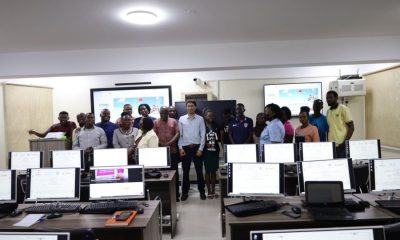
 Computing & IS1 week ago
Computing & IS1 week agoCoCIS CIPSD Short Courses Jan-Mar 2026
-
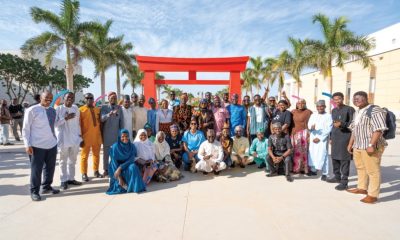
 General2 weeks ago
General2 weeks agoCall for applications: E-JUST TICAD8 African MSc. Scholarships